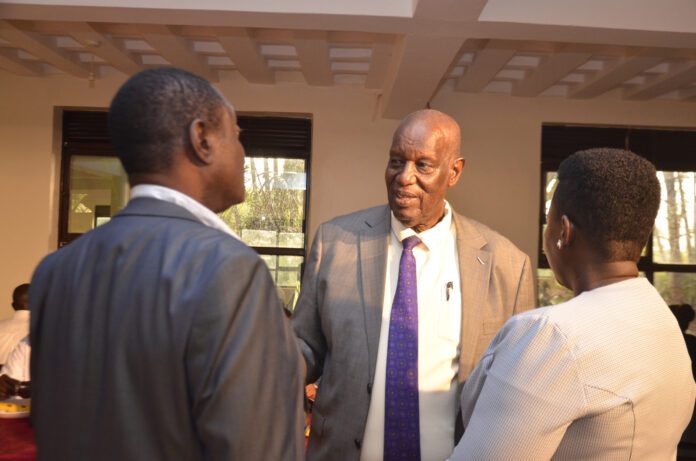
Communication officers in Western Uganda have been urged to lead efforts in countering negative propaganda and promoting accurate, development-focused narratives about the country. The call comes as government agencies intensify efforts to improve public perception and safeguard national unity.
Lt Col (Rtd) James Mwesigye, Commissioner for Resident District Commissioners (RDCs) in the western region, made the appeal on April 16 2025 during a two-day workshop held in Mbarara City. The event was organized by the Internal Security Organization (ISO) in partnership with the Ministry of ICT and National Guidance (MoICT) and the Government Citizen Interaction Centre (GCIC).
Addressing the communication officers, Mwesigye emphasized the strategic role communication officers play in shaping Uganda’s image and fostering national development.
“Help each other to promote government. Once you do that, you also save yourselves,” Mwesigye told officers. “Be patriotic; the government will continue to support you.”
He urged the officers to avoid collaborating with media outlets that publish stories portraying government in a negative light. Instead, he encouraged them to highlight achievements in infrastructure, social service delivery, and other public programs that are improving lives across the country.
Mwesigye also emphasized the importance of collaboration with security organs, particularly in exposing corruption.
He advised the officers to adopt investigative journalism practices and report any wrongdoing to DISOs and other anti-corruption units, who will escalate the information to the concerned parties in quest of a corruption-free Uganda.
“Unmask corruption and report these corruption cases. They need to be dealt with,” he said, while also cautioning officers against engaging in corrupt practices themselves.
Using the same platform, Mwesigye took a moment and warned RDCs against interfering in political party primaries, urging neutrality and fairness to ensure free and credible democratic processes.
He also emphasized the importance of monitoring government programs and effectively communicating service delivery, which he said boosts public satisfaction and minimizes grievances.
Maj. Edmund Turyantunga, Director of Mass Media at ISO, amplified Mwesigye’s message, identifying negative media propaganda as a national security concern that undermines Uganda’s development and investment potential.
“It is a missed opportunity if we fail to report on developments such as improved roads, hospitals, schools, and bridges,” Turyantunga said.
He added that in the journey to make Uganda the best investment destination in Africa, communication officers need to showcase the prospective investment opportunities that exist in Uganda within their districts.
Turyatunga emphasized that communication officers and security agencies must work hand-in-hand.
“While security personnel maintain stability, communicators are responsible for relaying this progress to the public and the international community,” Turyatunga noted.
Jesse Ofwoni, Senior Communications Officer at the Ministry of ICT and National Guidance, urged officers to leverage mobile phones and digital platforms to document and share government programs like the Parish Development Model (PDM). He advised using simple, clear language that is accessible to all citizens.
Robert Mugabe Sharp, the Deputy Executive Director of GCIC, shared with the communication officers’ skills and techniques for creating compelling content in formats that enhance engagement with audiences.
He emphasized that communication officers need to leverage modern and deliberate methods of packaging government information in an accessible manner for the public.
The engagement to organize district communication officers across Uganda is part of a broader national communication strategy that began in Karamoja, expanded to Teso and West Nile, and is now being implemented in Western Uganda, following a presidential directive to boost communication of government achievements, an assignment that has been taken on by ISO in partnership with MoICT.
The phased approach reflects the government’s ongoing commitment to strengthening its communication infrastructure across all regions to unify messaging, counter misinformation, and accelerate inclusive development.
have been urged to lead efforts in countering negative propaganda and promoting accurate, development-focused narratives about the country. The call comes as government agencies intensify efforts to improve public perception and safeguard national unity.
Lt Col (Rtd) James Mwesigye, Commissioner for Resident District Commissioners (RDCs) in the western region, made the appeal during a two-day workshop held in Mbarara City. The event was organized by the Internal Security Organization (ISO) in partnership with the Ministry of ICT and National Guidance (MoICT) and the Government Citizen Interaction Centre (GCIC).
Addressing the communication officers, Mwesigye emphasized the strategic role communication officers play in shaping Uganda’s image and fostering national development.
“Help each other to promote government. Once you do that, you also save yourselves,” Mwesigye told officers. “Be patriotic; the government will continue to support you.”
He urged the officers to avoid collaborating with media outlets that publish stories portraying government in a negative light. Instead, he encouraged them to highlight achievements in infrastructure, social service delivery, and other public programs that are improving lives across the country.
Mwesigye also emphasized the importance of collaboration with security organs, particularly in exposing corruption.
He advised the officers to adopt investigative journalism practices and report any wrongdoing to DISOs and other anti-corruption units, who will escalate the information to the concerned parties in quest of a corruption-free Uganda.
“Unmask corruption and report these corruption cases. They need to be dealt with,” he said, while also cautioning officers against engaging in corrupt practices themselves.
Using the same platform, Mwesigye took a moment and warned RDCs against interfering in political party primaries, urging neutrality and fairness to ensure free and credible democratic processes.
He also emphasized the importance of monitoring government programs and effectively communicating service delivery, which he said boosts public satisfaction and minimizes grievances.
Maj Edmund Turyantunga, Director of Mass Media at ISO, amplified Mwesigye’s message, identifying negative media propaganda as a national security concern that undermines Uganda’s development and investment potential.
“It is a missed opportunity if we fail to report on developments such as improved roads, hospitals, schools, and bridges,” Turyantunga said.
He added that in the journey to make Uganda the best investment destination in Africa, communication officers need to showcase the prospective investment opportunities that exist in Uganda within their districts.
Turyatunga emphasized that communication officers and security agencies must work hand-in-hand.
“While security personnel maintain stability, communicators are responsible for relaying this progress to the public and the international community,” Turyatunga noted.
Jesse Ofwoni, Senior Communications Officer at the Ministry of ICT and National Guidance, urged officers to leverage mobile phones and digital platforms to document and share government programs like the Parish Development Model (PDM). He advised using simple, clear language that is accessible to all citizens.
Robert Mugabe Sharp, the Deputy Executive Director of GCIC, shared with the communication officers’ skills and techniques for creating compelling content in formats that enhance engagement with audiences.
He emphasized that communication officers need to leverage modern and deliberate methods of packaging government information in an accessible manner for the public.
The engagement to organize district communication officers across Uganda is part of a broader national communication strategy that began in Karamoja, expanded to Teso and West Nile, and is now being implemented in Western Uganda, following a presidential directive to boost communication of government achievements, an assignment that has been taken on by ISO in partnership with MoICT.
The phased approach reflects the government’s ongoing commitment to strengthening its communication infrastructure across all regions to unify messaging, counter misinformation, and accelerate inclusive development.














